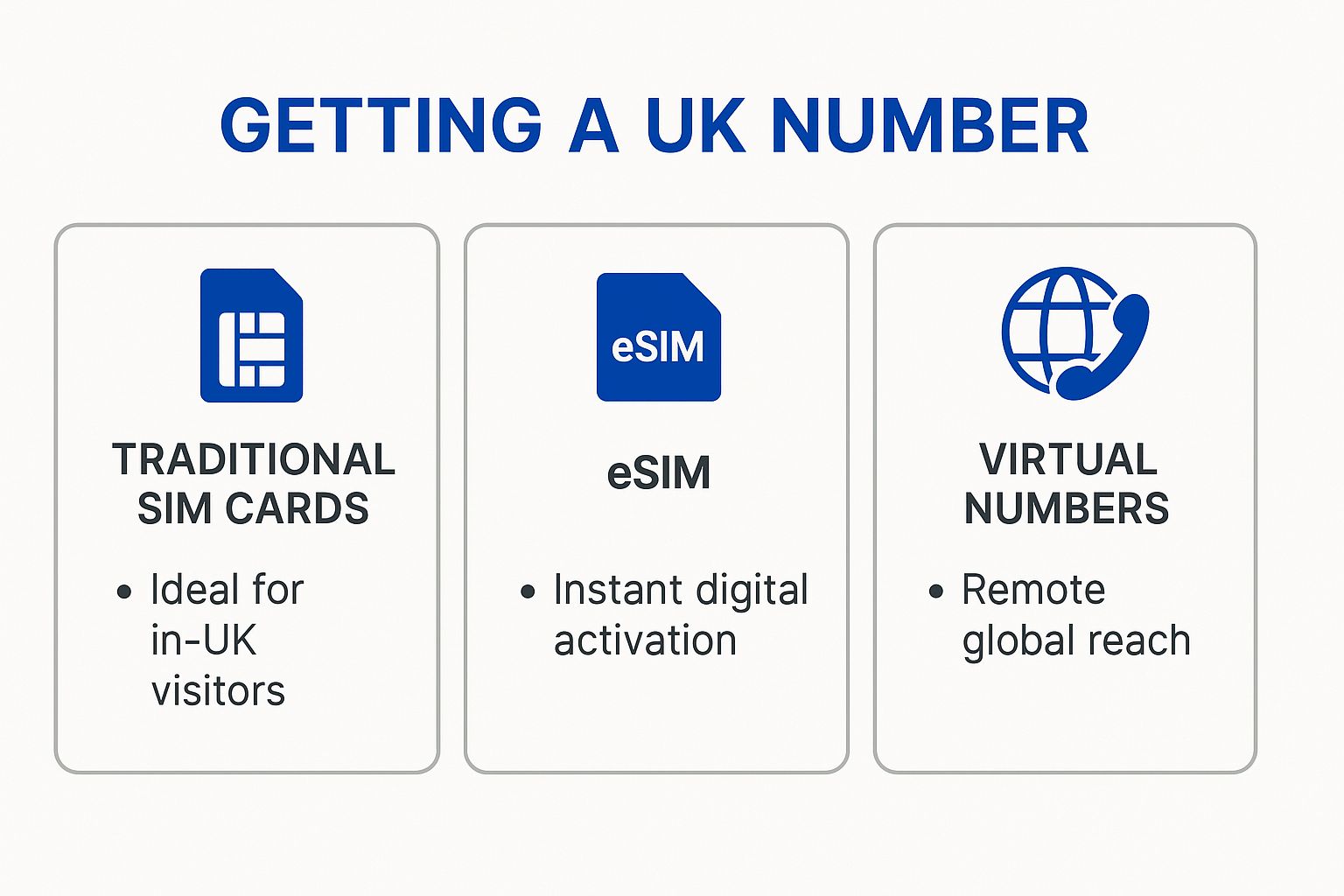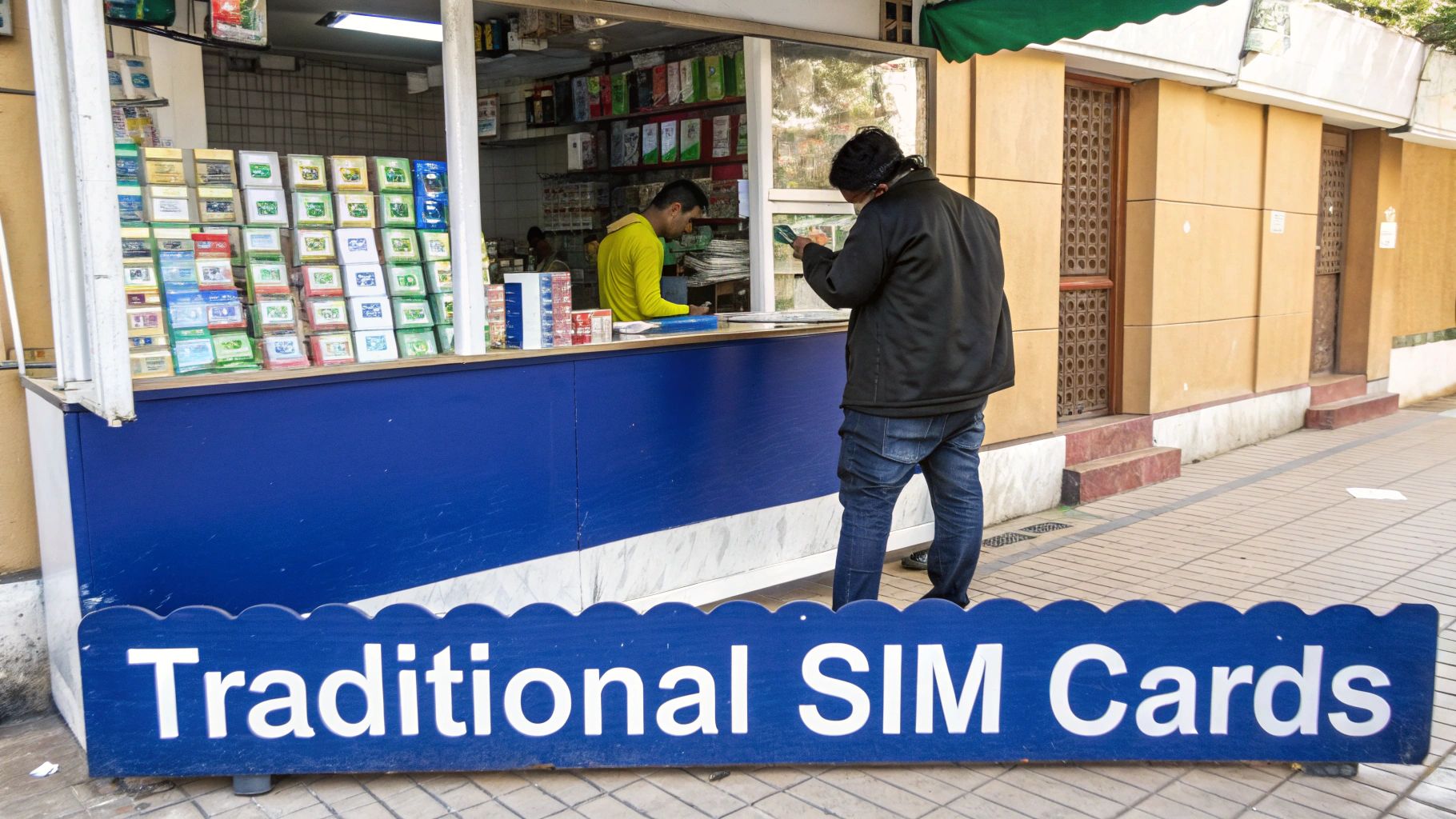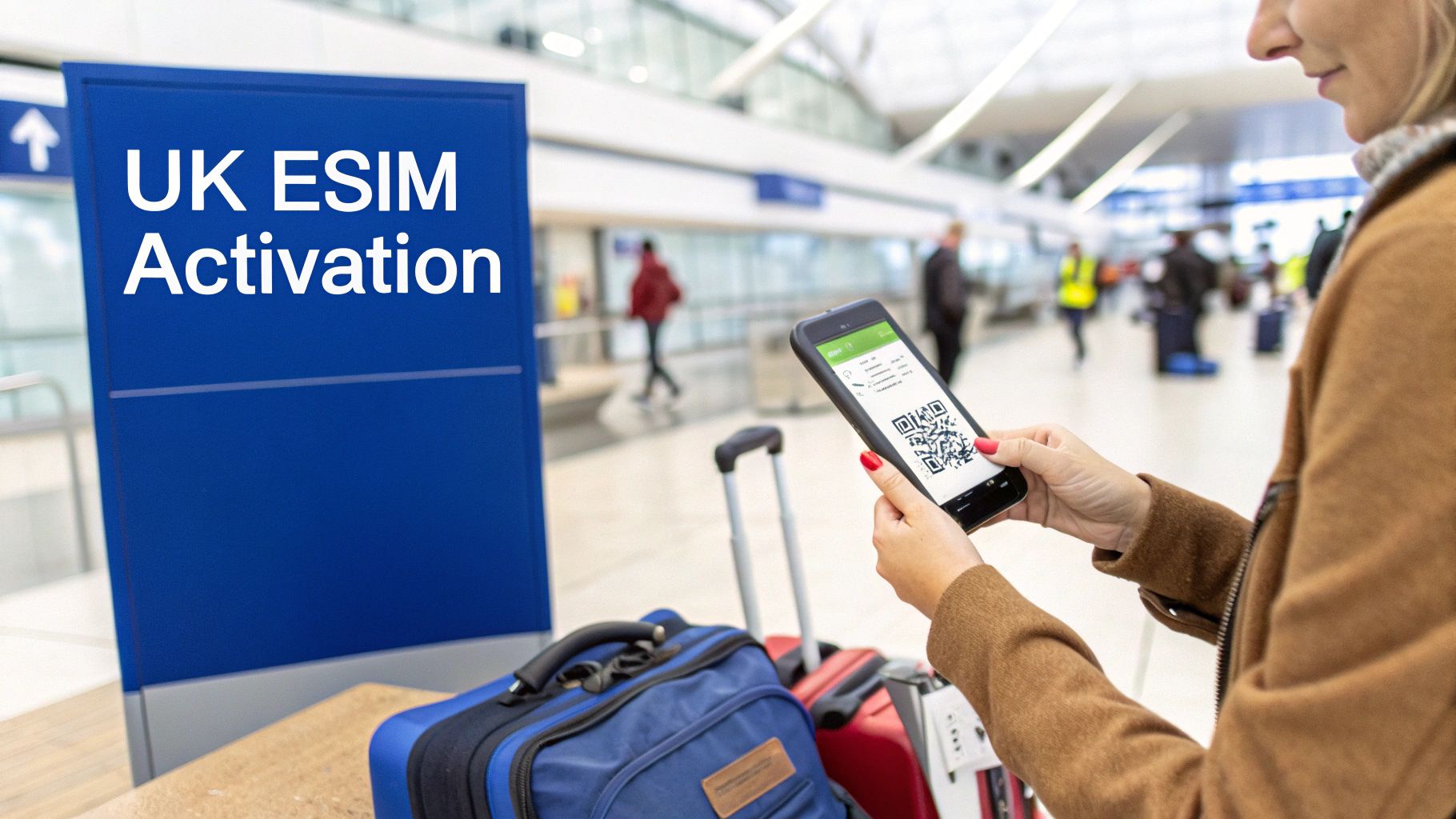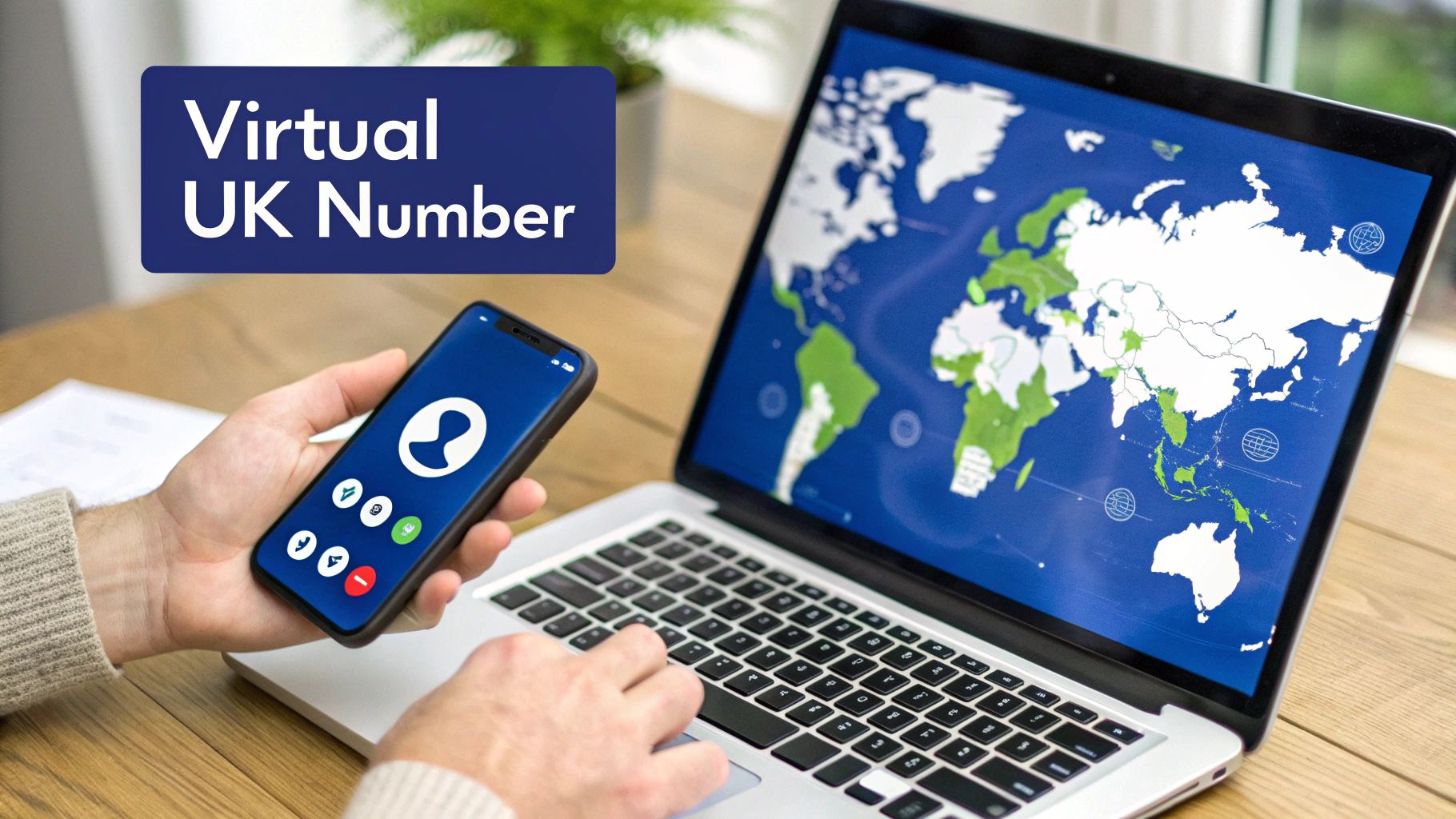Getting a UK phone number used to be a bit of a hassle, but these days you’ve got options. Really, it boils down to three main routes: grabbing a traditional SIM card, using a modern eSIM for a near-instant setup, or opting for a flexible virtual number you can use from anywhere.
The best choice for you hinges on a few things: whether you’re physically in the UK, what your phone can handle, and what you actually need the number for.
Why Bother With a UK Number?
For anyone moving to, travelling through, or doing business in the United Kingdom, getting a local number isn’t just a convenience—it’s practically essential. It’s the key that unlocks all sorts of everyday services. Without one, you’ll be surprised how quickly simple tasks become a headache, like setting up a bank account, confirming an online delivery, or even applying for a job.
Actionable Insight: If you’re an international business, a UK number instantly gives you a local presence and builds a sense of trust with British customers. For example, adding a local number to your website can significantly increase enquiry rates from UK visitors who might be hesitant to dial an international number. And of course, if you’re keeping in touch with friends or family here, a local number means you can dodge those eye-watering international calling and texting fees.
A Quick Look at the UK Mobile Scene
The UK mobile market is incredibly active. To give you an idea, at the start of 2025, there were 88.4 million active mobile connections—that’s a staggering 127% of the total population. This shows just how common it is for people to have more than one number, often one for personal use and another for work. Technology like eSIMs has made this much easier.
This crowded market is great news for you, as it means more choice and competitive pricing. You can dig deeper into the UK’s digital trends over at Datareportal.com.
To help you cut through the noise, this guide will walk you through your options. The infographic below gives you a quick visual summary to get you started.

As you can see, each method is designed for a different situation, from needing a physical SIM in the UK to wanting remote access from the other side of the world.
For businesses looking to establish a solid footprint, pairing a UK number with other professional services is a smart move. Many companies also explore setting up a UK virtual address to create a complete, credible business identity. Now, let’s dive into each option so you can find the perfect fit.
Comparing Your UK Number Options at a Glance
To make your decision even easier, here’s a quick comparison of the main methods we’ll be covering. Think of it as a cheat sheet to help you see which path aligns best with your needs.
| Method | Best For | Typical Setup Time | Requires UK Address? |
|---|---|---|---|
| Physical SIM Card | Long-term residents, travellers needing data & calls | 5-10 minutes (in-store) | Sometimes, for delivery or registration |
| eSIM | Tech-savvy travellers, immediate connectivity | 2-5 minutes | No |
| Virtual/VoIP Number | International businesses, remote workers | 5-15 minutes | No |
| Mail Forwarding Service | Non-residents needing a physical address | Varies (days) | Yes (provided by the service) |
Each route offers its own set of benefits. A physical SIM is straightforward and reliable, while an eSIM offers incredible convenience. Virtual numbers, on the other hand, provide unmatched flexibility for businesses operating globally. Now, let’s look at each one in more detail.
Getting to Grips with Traditional UK SIM Cards
For many, the most straightforward route to a UK number is the good old-fashioned physical SIM card. It’s a classic for a reason—it’s reliable, familiar, and a solid choice if you’re already in the country or planning a longer stay. This approach gets you set up with calls, texts, and mobile data without much fuss.
You’ve really got two main paths to go down: Pay As You Go (PAYG) or a monthly contract. The right one for you hinges entirely on how long you’ll be in the UK and what you’ll be using your phone for. Each has its perks, catering to everyone from short-term tourists to people moving here for good.
The Flexibility of Pay As You Go
Pay As You Go, often shortened to PAYG, is the perfect solution for short visits or if you simply don’t want to be tied into a long agreement. You can walk into just about any supermarket or corner shop and pick up a SIM from providers like Three, giffgaff, or Lycamobile. The best part? There’s no credit check. You just top up your credit or buy a ‘bundle’ of data, minutes, and texts that typically lasts for 30 days.
Practical Example: Imagine you’re visiting London for two weeks. You can walk into a Tesco Express, grab a giffgaff SIM for £1, and activate a £10 “goodybag” right on your phone. This gives you plenty of data for Google Maps, social media, and a local number for booking restaurants or calling a taxi, all without any long-term commitment.
Actionable Insight: Many UK airports have vending machines selling PAYG SIM cards right in the arrivals hall. This is a fantastic way to get connected the moment you land, saving you the hassle of hunting for a shop after a long flight. Look for WHSmith or SIM card-specific machines.
Committing to a Monthly Contract
If you’re settling in the UK for a longer period—whether for work, study, or relocation—then a monthly contract is usually the more cost-effective option. The big networks like Vodafone, EE, and O2 offer 12, 18, or 24-month contracts that come with much more generous allowances for data, calls, and texts at a better price than PAYG.
This route, however, does require a bit more paperwork. To sign up for a contract, you’ll almost certainly need to provide:
- Proof of a UK address: A recent utility bill or a tenancy agreement usually does the trick.
- A UK bank account: Networks typically take payment via Direct Debit.
- A credit check: They’ll want to assess your financial history before approving the contract.
This is what a typical PAYG SIM card offer page looks like, showing just how simple it is to get started.

As you can see, providers make it easy to order a free SIM and then just add a data pack later, offering a hassle-free starting point for anyone new to the UK.
Embracing the Convenience of UK eSIMs
For the modern traveller, or frankly anyone who wants things done now, the eSIM is a genuine game-changer when you need a UK number. An eSIM (or embedded SIM) is simply a digital version of the traditional SIM card, letting you activate a mobile plan without fumbling around with a physical nano-SIM. That means no more fiddling with tiny plastic cards or waiting for one to arrive in the post.

The whole process is incredibly straightforward, which is perfect for those who like to plan ahead. Practical Example: You’re in New York, preparing for a business trip to London next week. You can go to the Airalo website, purchase a 10GB UK data plan, and receive a QR code via email instantly. You scan it, and the eSIM installs on your phone. The plan only activates once it connects to a UK network, meaning you can set it all up before you even leave home and be connected the second your plane lands at Heathrow.
Why Choose an eSIM for Your UK Number
The biggest draw of an eSIM is the sheer speed and convenience. There’s no need to hunt down a shop upon arrival, which is a fantastic way to ensure you’re connected from the moment you touch down. But beyond the instant setup, eSIMs have another massive advantage.
Actionable Insight: One of the most practical features of eSIM technology is the ability to use two numbers on one phone. This means you can keep your home country’s SIM active for receiving important calls and texts (like bank authentications) while using your new UK eSIM for affordable local data, calls, and navigation. It’s the best of both worlds.
This dual-SIM capability is incredibly handy for keeping business and personal calls separate or simply dodging those eye-watering roaming charges from your primary provider. Most modern smartphones now come with this tech built-in.
Checking Your Phone’s Compatibility
Before you jump in and buy an eSIM, it’s vital to check your device is actually compatible. The good news is that most flagship phones released in the last few years are already equipped for it.
This typically includes:
- Apple: iPhone XS, XR, and all later models (including the iPhone 11, 12, 13, 14, and 15 series, plus SE models from the 2nd generation).
- Samsung: Galaxy S20, Note 20, Z Flip, Z Fold series, and any newer models.
- Google: Pixel 3 series and all subsequent versions.
It always pays to double-check your specific model on the eSIM provider’s website, but for many people, embracing this digital solution is by far the quickest route to getting a fully functional UK number.
Leveraging Virtual Numbers for Global Reach

What if you need a UK number but have no plans to be in the country? This is where virtual numbers and Voice over Internet Protocol (VoIP) services come in. They’re a brilliant way to establish a local presence without any geographical ties whatsoever.
These services run entirely over the internet. When someone dials your virtual UK number, the call is instantly routed through an app to your smartphone, laptop, or desk phone, no matter where you are in the world. This makes them a perfect solution for international businesses, remote workers, and expats.
How Virtual Numbers Work in Practice
Practical Example: Imagine you’re running a small e-commerce business from Spain but want to sell to UK customers. You can sign up for a virtual number service and choose a London (020) or Manchester (0161) area code. This number is then displayed on your website. When a UK customer calls it, the call is seamlessly forwarded to your mobile in Spain via an app, at no extra cost to them. This instantly makes your business appear local and trustworthy, encouraging more sales.
Actionable Insight: The core benefit of a virtual number is perception. It removes international barriers, making your business feel accessible and established within the UK market, even if you’re thousands of miles away. Use it in your marketing, on business cards, and in your email signature to create a consistent, professional UK presence.
Many businesses are now exploring the benefits this technology offers. If you want to understand more about the setup and advantages, you can learn about getting a virtual phone number in the UK through dedicated service providers who specialise in these solutions.
Comparing Top Virtual UK Number Providers
Navigating the world of VoIP providers can feel a bit overwhelming, so we’ve put together a quick comparison of some popular options. This table breaks down what they offer, how much it costs, and who they’re best suited for.
| Provider | Starting Price (Monthly) | Key Features | Ideal User |
|---|---|---|---|
| RingCentral | Around £15 | All-in-one system (calls, video, messaging), extensive integrations. | Established SMEs needing a comprehensive communication suite. |
| CircleLoop | Around £5 | Simple app-based interface, unlimited UK calls on most plans. | Start-ups and solo entrepreneurs who need a straightforward, mobile-first solution. |
| Vonage | Around £10 | Highly customisable, strong on business features like call recording. | Growing businesses that need a scalable and feature-rich phone system. |
| Dialpad | Around £12 | AI-powered transcription and call summaries, modern interface. | Tech-savvy teams and remote companies looking for advanced productivity tools. |
While prices and features vary, most providers offer a core set of tools designed to make your international business operations run smoothly. It’s always worth checking their latest packages directly, as deals and features change all the time.
Key Features and Costs to Consider
When you look for a way to get a UK number online, you’ll find that providers offer far more than just call routing. Most services come packed with valuable features that can transform how you communicate.
Here are some essentials to look out for:
- Call Forwarding: Direct incoming calls to any device or number you choose.
- Voicemail to Email: Get audio files of your voicemails sent straight to your inbox – a huge time-saver.
- SMS Capabilities: Send and receive text messages, which is crucial for customer communication and appointment reminders.
- Business Hours: Set rules for when calls are answered live or sent directly to voicemail.
Pricing for these services is typically a monthly subscription, often starting from as little as £5 to £15 per month. This small investment can unlock significant opportunities for global entrepreneurs and businesses aiming to build a solid presence in the UK.
Common Pitfalls When Getting a UK Number
Getting a UK mobile number often seems straightforward, but a few slip-ups can leave you with extra charges and avoidable headaches. I’ve watched both tourists and business travellers get caught out by the same issues. A bit of advance thinking will save you time—and money.
Here are the most frequent missteps:
- Picking the wrong plan. Practical Example: A tourist here for two weeks might be tempted by a £20 monthly plan with huge data allowances, not realising a £10 Pay As You Go (PAYG) bundle or a 7-day eSIM would cover their needs for a fraction of the cost. Always match the plan’s duration to your stay.
- Forgetting to unlock your phone. Actionable Insight: Before you travel, contact your home network provider and ask them to unlock your handset. If they can’t, your phone simply won’t accept a UK SIM, rendering it useless for local calls and data. Do this at least a week before you fly.
Overlooking The Fine Print
Even “unlimited” bundles come with hidden brackets. Many providers slow your speeds once you pass a set limit, so that endless data can feel anything but.
Actionable Insight: Always double-check roaming clauses if you plan to travel from the UK into Europe. Post-Brexit, several networks have quietly reinstated roaming fees. Before a day trip to Paris, check your provider’s policy—otherwise, a weekend abroad can trigger eye-watering bills.
For businesses, relying on a personal number for company matters can look unprofessional and even breach compliance. A dedicated business line, teamed with a registered office address, gives you both polish and peace of mind.
Your Questions Answered
Let’s clear up some of the common questions that pop up when you’re trying to get a UK phone number. Getting these details right can save you a lot of hassle down the line.
Can I Really Get a UK Number for Free?
While a completely free, long-term number is a bit of a unicorn, you can certainly get started without spending a penny. Some networks, like giffgaff, will happily post you a free Pay As You Go SIM card. You only pay when you decide to add credit.
Many VoIP services also offer free trial periods to let you test the waters. For any number you plan to use consistently, though, it’s wise to expect a small ongoing fee to keep it active.
Do I Need a UK Bank Account to Get a Number?
In most cases, absolutely not. This is a common worry, but for the most popular options—Pay As You Go SIMs, eSIMs, and the majority of virtual number providers—you can pay easily with an international credit or debit card.
The only time a UK bank account usually becomes necessary is if you’re signing up for a long-term monthly contract with one of the big carriers like EE or Vodafone.
For most people just visiting, or businesses operating from abroad, your existing payment methods will work perfectly fine. It’s one less barrier to worry about.
Can I Get SMS Verification Codes on a Virtual Number?
This is a big one, and the answer is a definite it depends. The functionality varies massively between providers, so you need to be careful here.
Some of the more premium virtual number services are built for this and fully support SMS, including those all-important short-code texts from banks, social media, and apps like WhatsApp. Others, however, are more basic and may only handle texts between people, or have no SMS feature at all.
Actionable Insight: If receiving verification codes from services like WhatsApp or your bank is crucial, always double-check the provider’s feature list for “SMS Short Code” compatibility before you commit. Contact their support team for confirmation if you’re unsure. This will save you a major headache later on.
Ready to build your UK presence with professional, reliable services? Acorn Business Solutions offers everything from virtual addresses to company formation, helping you create a credible foundation in the UK. Explore our solutions to get started.
